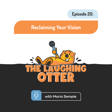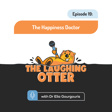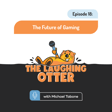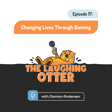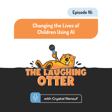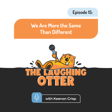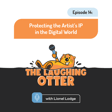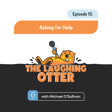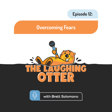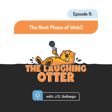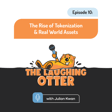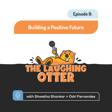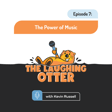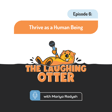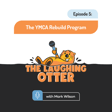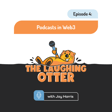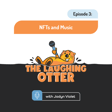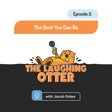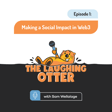Become a Creator today!Start creating today - Share your story with the world!
Start for free
00:00:00
00:00:01

Social Impact DOAs with Deepa Chaudhary
Transcript
Introduction to Podcast and Guest
00:00:07
Speaker
Hello, everyone. Welcome to the Laughing Autumn, where we are making the world a happier place one person at a time. I'm your host, Jeff Bogenberger. And today I'm super excited. We had someone on from back in Canada. We got Deepa, who's a social impact entrepreneur and founder of Impact Down Media. Deepa, welcome to the show. Thank you, Jeff, for having me today. Yeah, it's great to have you on.
What is Impact DAO Media?
00:00:34
Speaker
I think everyone by now will go, what is
00:00:38
Speaker
Impact DAO Media. Maybe you can share a little bit about what you're up to. Yeah, so Impact DAO Media is a DAO. It's a media DAO. So for people who don't know what DAOs are, DAOs are a new type of organization that's internet-based. It has distributed teams, people from all over the world. If they like the mission, they can come and join the DAO and contribute to our activities.
00:01:07
Speaker
So that's what we are. We are an internet based organization with team members from all over the world. And our focus is on creating awareness about impact dials and highlighting the builders and showcasing their stories and putting the good word out, not just within Webtree, but also outside Webtree in terms of all the great stuff that's happening with crypto and social impact. Well, yeah, well, that's obviously
00:01:36
Speaker
strikes a nerve with myself and the laughing otters since the laughing otter is all about making a social impact.
Recruiting and Community Engagement Strategy
00:01:45
Speaker
What channels are you using to find people to contribute to your DAO?
00:01:51
Speaker
Oh, so it's mostly Twitter. Twitter is my community. I feel like everybody who is in crypto is on Twitter. And so it's my extended family. And my DAO is my, you know, a subset of that community, basically. So when I first set out to build the DAO or do a call for contributors, I actually reached out
00:02:15
Speaker
Twitter and I reached out to a couple of influencers in the crypto space and asked them to retweet my call for contributors and they retweeted and people saw I mean my my call for contributors got amplified they read the proposal I had put down a proposal in terms of what impact our media is going to be what we intend to do we at that point of time we intended to conduct an intensive research on 10 to 12 impact hours and to uncover all the learnings
00:02:44
Speaker
that the builders have had in building those dows and to put those learnings in a book that would become a definitive guidebook on impact dows for people who are just entering the space. So that was the objective. I shared the proposal, some people retweeted it, and that led to a lot of them applying. I had put out a small form. Basically, I just wanted to know their Twitter or LinkedIn handle because you're collaborating with people on the internet, so I just wanted to feel comfortable who I'm gonna be working with.
00:03:11
Speaker
And so everybody who joined, all were great people and they are still with us. You know, the original team is still with us and more people. So this happened in June and we are still continuing to function as a DAO and lots of new people joined along the way, but the original team continues to stay.
Roles and Responsibilities in Impact DAO Media
00:03:30
Speaker
And so what are some of the activities that these contributors are doing for you?
00:03:35
Speaker
Oh, so because we are a media dao, we had very specific requirements in terms of the kind of people we want to be part of this dao. So basically podcasters, writers, micro content creators, people who can hold to the spaces, people who could create graphics. So basically all kind of content creators.
00:04:00
Speaker
So that's what's the call and those are the kind of people who get inspired to work at adults. It's basically people at the intersection of Web3, social impact and media that's part of our organization and the kind of work that they do is that we did about so the idea was to research 30 impact hours and we wanted to have one-on-one conversations with the builders
00:04:25
Speaker
uh you know the founders and the contributors because we wanted to understand this new organization types because it's so radically different from traditional organizations so we wanted to understand how does work get done because people have lots of myths about dows they think dows are leaderless or they're just a chat group on telegram with a shared
00:04:43
Speaker
wallet on the blockchain, you know, there are all these beliefs about DAOs. So we really wanted to understand what goes on behind the scenes, like how does work get done? You know, is it what people say that they're just a chat on Discord with a wallet or on Telegram? And so we really wanted to understand how things get done. How do they organize themselves? And so we wanted to do all these interviews and our goal was to do at least three or four interviews for DAOs. So we ended up doing 30 interviews with founders and contributors.
00:05:13
Speaker
And so the initial team contributed in terms of doing these interviews, then transcribing these interviews, doing interview write-ups, editing for podcast purposes, because each of those 30 interviews are going to be streamed as podcasts and interview write-ups on a blog.
00:05:33
Speaker
So these are some of the various activities in which the team contributes. They're mostly all part-time contributors. I'm the only full-time person working in the DAO. So it's very bounty-based. Some people actually do pro bono work for us because we don't have that much.
00:05:52
Speaker
funds, but some are completely pro bono based, some we really bounties with tasks that we want to get done. And so they accept the bounty, which is, and they complete the tasks.
Debunking Myths about DAOs
00:06:06
Speaker
Right. So, so what are you when you when you started researching what's working in DAOs and what's not what what are some of the highlights that you found that's working in this space?
00:06:19
Speaker
Oh, so some of the highlights, you know, again, there are lots of myths around these DAOs, like people are like, they call them the leaderless organization or an organization which is governed by the smart contract, or where there is democratic decision making. So these are some of the things that people generally use to describe DAOs. And our top learnings have been that most of these things are false, actually, and none of this is true.
00:06:46
Speaker
Because DAOs are not governed by protocols, they're governed by people, or smart contracts for that matter. These are organizations made up of people, so no matter how many rules you write on the blockchain to govern them, they will not auto-govern. You need people, and they just function like any other organization does with people being coordinated around a task.
00:07:09
Speaker
There's a lot of human coordination, so they're not automagically working, if you think so. You know, that's how they describe that.
00:07:18
Speaker
There is very little human intervention. It's mostly automated. Everything is automated. That's not true. Another thing that we discovered about DAOs are that obviously there are leaders. It's not a leaderless organization, but there are no bosses. So everybody is a leader. The kind of people who get attracted to work in DAOs are very self-driven entrepreneurial people. Anybody who's not will not thrive in this culture because it requires a lot of agency. It requires a lot of ownership, taking responsibility for things.
00:07:48
Speaker
Uh, even before you being assigned, you basically show initiative and say, Hey, I can do that for you. So it's a very different culture. Uh, so those have leaders that do not have bosses and they're definitely not leader less. So that's something that we learned. The third thing we learned about that is that, um,
00:08:06
Speaker
You know, they describe them as being, you know, decentralized organizations right like decentralized in terms of power like there is no one centralized authority giving deciding and passing down directives in terms of what needs to be done. It's not the case so people collectively decide but
00:08:23
Speaker
too much obsession with democracy is not good either and that's what we've seen in some of very traditional vows that they're obsessed with democracy because they want to be like democratic in their decision making and that doesn't work all the time. There's been you know what we've seen in our study and also when we've had conversations with experts during this period
00:08:45
Speaker
of our study is that too much voting is not good. It leads to polarization. It leads to toxicity. And sometimes people just vote without not knowing the context. And that's not healthy either. So there's definitely collective decision making. People debate on matters and come to decisions. And there's definitely more heated discussions around budgeting and top level matters. So it's definitely collective. It's not centralized.
00:09:14
Speaker
But it is not like democratic as well, because democratic means everything goes up a vote. Right. And since we're in the same space, all of the challenges around being completely democratic are all the challenges that rear their ugly heads every time there is
00:09:43
Speaker
a federal or state level or provincial level election. We're seeing it now in the United States with how difficult it is to control that process.
Challenges in Quality Management and Community Efforts
00:10:00
Speaker
Where that balancing line is is what everybody's trying to find. How are you managing
00:10:13
Speaker
quality of output with that, like that's always been a challenge for me is it's great for people to work pro bono. It's great for people to work for a bounty provided that they deliver a high quality output. Otherwise there's challenges there.
00:10:39
Speaker
That's right. And that's something that I'm learning because this is the first time that I've been operating in a DAO and I founded one. And initially it was just through great vibes. Whoever showed up in a Discord and whoever showed eagerness to do a task, took the task. But very slowly you come to realize who are the people who really deliver and who don't.
00:11:00
Speaker
And then it's just a very self-eliminating process like generally like you don't want to give them more bounties going forward or they themselves drop out because you know like
00:11:14
Speaker
The output is not that great and they kind of realize that. It just vibes sensing, I guess. But it's something that I'm learning too because I really wanted it to be community driven and that whoever is in a community, in a Discord has shown interest for it. So definitely they should be the first go to people.
00:11:33
Speaker
But now, over this period, we as a team, a core team, the originals who came together on day one and started the DAO, we've kind of figured, you know, we've learned through this process and we now actively seek out specific people, like people that we need of specific skill sets. And now, I mean, it's been great. Luckily, we've attracted some really great folks in our DAO. All the people, in fact, who've done pro bono work are highly
00:12:01
Speaker
specialized in what they do like we have this writer, his British in South Korea and he has he's a published book author and he
00:12:12
Speaker
He writes for us and he's gonna be editing our book which is coming out this month and he's absolutely great and he's part of the original team and he does everything pro bono, like he refuses to take anything from us. And similarly, there was a branding agency that did pro bono work for us. They're based in New York City and they were just so moved by a mission and what we are trying to do. And they've helped certain DEXs, decentralized exchange, they've helped them with their branding and helped them launch.
00:12:41
Speaker
But for us, they did it completely pro bono. So all the pro bono people are highly specialized in what they do and they're absolutely amazing. I think the learnings have been mostly around the bounty area. Like when we release tasks, we've not spent too much time in terms of doing assessment.
00:12:58
Speaker
We just have gone with the eagerness of the person to deliver. And sometimes the quality is not that great or sometimes they don't deliver on time. But these are all learnings right now because this whole space is so new. It's just barely a year old. So I think in the next season, you know, once a book is out this this month, we continue to document these impact thousand to to basically highlight the stories. And we intend to launch a digital magazine. So we'll be much smarter, I think, for season two in terms of how we go about
00:13:28
Speaker
giving out these bounties? Yeah, it's a challenge. But that's not different than any outsourcing or finding suppliers and just in general, it's always for every business, that's a challenge to find the good ones. What I've found with the bounties and people doing work for pro bono, a lot of times the ones that are
00:13:58
Speaker
to say, you know, don't worry about paying me now. You get the better quality of work because they're confident in their abilities to prove themselves first. But it's, yeah, it's a balancing act and it's something that everybody, it's a challenge for everybody, but that's not unique to Web3. That's anyone who's ever had suppliers outsourced or even hiring
00:14:27
Speaker
full-time employees. Sometimes you get it right, sometimes you don't.
00:14:31
Speaker
So where, sorry. No, I would like to add that because now it's different. It's like the people that come to you rather than you going to people. So for instance, if I have to outsource or if I want somebody to edit my podcast, I'll probably go on Fiverr and try to find them. But I would rather find somebody from the community because I have like almost 200 people in my Discord and the link of my Discord is not widely circulated. So they've really taken the pain to find
00:14:58
Speaker
impact our media discord and have come there and are learning about what we are doing. And so they are already very interested in what we are doing. And so my first go-to would always be the community. I think going forward, we would put some assessment process just to assess their minimum
00:15:17
Speaker
you know, the ability to deliver good quality work. I think that's very important. And some really great developments are taking place in this space, like Soulbond tokens. I'm not sure if you know about them. These are badges that are, you know, they're like NFTs, non-fungible tokens, but they do not have any financial value attached to it. They cannot be transferred, but they can be issued to you.
00:15:40
Speaker
and they can live in your wallet and they act as attestations or validation for your work or for whatever you're doing. So we're going to be one of the first DAWs to actually give out Soulbond tokens to our contributors. And so these Soulbond tokens will be given to contributors who obviously delivered
00:15:59
Speaker
Good output work and then they this becomes there the kind of a batch that they can take and go to the next style and say hey, you know I have this badge from impact on media. I've done work for them and That helps them unlock opportunities and build trust in the next style, you know So when when you're hiring next time, you know, or when you're giving the bounty, you know, this person is capable He's done say
00:16:23
Speaker
podcast editing somewhere else before, you know, so there's this stress factor. So SPDs are going to be really interesting development. They're not, the rails are being developed. Autospace is the company that's building it. They're based in Berlin and we're going to be partnering with them in terms of rolling out SPDs for our contributors. Yeah, that's fantastic.
00:16:52
Speaker
it does give a lot more credibility to, even in traditional sense, anyone who's ever hired people, it's almost impossible to ascertain the truth of a CV until well into the interviewing process. So by having some of these verification stamps is gonna be really helpful. So where are,
00:17:22
Speaker
Where are you guys heading now?
Vision for Impact DAOs and Educational Initiatives
00:17:24
Speaker
What's in the next six months for you guys?
00:17:27
Speaker
So we want our goals to be the leading voice for impact dows. So impact dows, think of them as nonprofits, philanthropic organizations that are purely internet based. Like they by default are distributed teams, decentralized governance, transparent organizations, because nonprofits currently have a lot of issues in terms of, you know, the organization structure or in terms of
00:17:54
Speaker
Just just the way of thinking, you know, like, or the way of operating is very old fashioned, outdated, sometimes too much bureaucracy. But these are different kinds of these are very much like nonprofits, social impact organizations, but very fresh thinking, you know, they want to just radically think everything.
00:18:13
Speaker
and rethink and reimagine. And so in fact, those are basically nonprofits based on the internet and they use blockchain tools that are specifically designed to facilitate online collaboration and building trust. For instance,
00:18:30
Speaker
you know, the multisignature wallet, which is basically a shared bank account on the blockchain and certain tools with regards to voting because, you know, governance, decentralized governance is such a big part of being a DAO. But in our case, for instance, the only blockchain use case that we have is of the multisig wallet. So we have a shared bank account. We have multiple signatories before we release funds. Three people need to sign up.
00:19:00
Speaker
So that's the only use case of the blockchain that we have. But going forward in the next six months, we obviously have a book that's coming out this month. It's going to be the definitive guide on how to build impact. So we want to educate people and inform people about all the great stuff that's happening in Web3 and crypto and how they can build in Web3 for impact, for social impact. So that will be the go-to book for them to read and understand what's happening.
00:19:30
Speaker
And in the future, we want to continue to highlight these great stories about social impact in the space and we want to launch a magazine which will be very much like Thrasher. Thrasher is a skateboarding magazine and their interview style is very authentic, very raw.
00:19:46
Speaker
And it's very visual. And so we want to adopt the same elements in terms of very authentic storytelling of our impact, our builders, the impact that they're making, and make it really inspiring and inspiring for people who are not in the space to learn and start building in Web3. So that's our long term vision. We want to change the narrative around crypto. Crypto is mostly seen in just one way, like it's a Ponzi scheme or it's a scam, but it's
00:20:15
Speaker
It's obviously all that bad elements are there, but there's so much good that's happening that never comes out in the mainstream media. And so we want to bring those stories out. We want to form the bridges with web2 organizations and typical nonprofits and help them see what's happening and how they can transform their organizations by bringing some of the benefits of the DAO way of doing things. Yeah, I love it. Very much in line with what Glabbing Otter is doing.
00:20:45
Speaker
And I'm in agreement that anybody who thinks that Web3 is all about currency and NFT speculation is missing the point. The Web3 movement has more to do with the positive conversations that are happening amongst
00:21:12
Speaker
hundreds of millions of emotionally charged people who believe that this is a vehicle to make some positive change in the world. That's the power of Web3. The technology is just secondary. It just happens to be a connector. It's the people within Web3 that excite me the most.
00:21:34
Speaker
That's right. And it's so beautiful because, you know, now that we mostly live our lives on the Internet, we have not formed, we've not used Internet to form connections, right? We're mostly using it for consumption, like we're just consuming all the time. But for a change, we are forming connections and we are forming connections and
00:21:56
Speaker
forming communities around a shared
Flexibility and Inclusivity in DAOs
00:22:00
Speaker
purpose. I think that is so powerful. That purpose is so powerful, you know, like people coming around and they have this grand vision that they want to accomplish and it's meaningful work. It's not just coming around to play video games, right?
00:22:13
Speaker
I mean, it's beyond like beyond it's giving them some purpose, you know, something that makes them wake up every day in the morning and get them excited. And then they want to collaborate with the teammate in Argentina and India and in Australia and then, you know, work together online. This is all very it's all online. And so I feel like that's the most beautiful thing about Web3. But the irony is
00:22:43
Speaker
You hear the term decentralization all the time, which does play a part. But from a purely human standpoint, in my lifetime, I've not seen anything that is connecting people and building communities.
00:23:04
Speaker
driving wedges out of human relationships as much as Web3. It's people are being brought together under this banner. Like I don't think we've seen since the 60s movement where people are just coming together and having really
00:23:31
Speaker
positive conversations on the direction the world needs to go. And it's just coincidentally that it's just a technology that is driving all that.
00:23:41
Speaker
And also, yes, and also the flexibility, like, you know, generally you have to join a traditional organization and there's such a high barrier to entry, right? Like you have to, I mean, you don't have access to that organization. You have to go through multiple interview processes. Then you get some ads badge that gives you access the moment you leave, you have to give that badge away. But here, this is so flexible. Like if I like your mission, I can go join your discord and just sit there for months.
00:24:07
Speaker
and just absorb your culture and your mission and how work gets done. And maybe two months later, I'm like, hey, I raised my hand and say, I would love to contribute and see, I've already done some work. I realized that you guys had problem in so-and-so area, so I have figured a solution for you.
00:24:23
Speaker
And so it's so easy to join these communities. All you got to do is show up in the Discord. And as I said, you can immediately get started and say, I'd like to help out with this, or you can just wait. And when you're ready, you can get started. And if you think that it's not aligned with your values anymore, you can exit at any point of time and go join some other community. So it's a very different way of doing things.
00:24:54
Speaker
Yeah, no, it's great. And I think wherever the internet left off, Web3 is now taking the next step of just eroding national borders and this global myth that we're all different because people from all over the world are collaborating on these projects. And I think that there's
00:25:23
Speaker
A lot of people who are now communicating the rightful message that people from all over the world are great people. They're fantastic to work with. It doesn't matter where you come from. Everybody has the same values and work ethic and desire to be happy and contribute. That's the part that I love about Web3.
00:25:52
Speaker
That's what got me excited about it when I first heard about it. And that's only gotten more and more every day as I meet people from all over the planet in this space. That's right. You're absolutely right about that. All right. What else do we need to know, Deepa? What else do you want us to know about Dow, about Impact Dow Media?
00:26:23
Speaker
Impact DAO Media is just getting started. We started as an organization in June and for the past couple of months, five months, we've been busy researching the 12 impact DAOs that we selected for a study. They are some of the best and the most mature DAOs that exist as of date because most of them started out in 2021.
00:26:43
Speaker
while the Tao explosion only took place in 2022. So they're one of the most, the mature ones, the ones that have learned a lot through the process. And so there've been, there are 12 of them, they're part of a study for, and then, and we're writing a book with, based on all our conversations, 30 conversations that we've had, we're going to be
00:27:04
Speaker
Busting a lot of myths around DAOs, we're going to lay out the facts because what we've seen in the mainstream every time a journalist puts out anything about DAOs, they just do a couple of Google searches and whatever definition comes out first, they put that and the wrong narrative keeps going forward and forward. So we want to correct a lot of things. And so the book is coming out this month and
00:27:28
Speaker
It's going to be absolutely free. People can just download the digital copy or read the entire book online. We also want this book to be very different from typical books. It's going to be very dynamic. The book, we're going to be treating it as an app. So we will keep releasing updates. And as we feature and uncover learnings from newer DAWs, we keep adding them. So people have this book, which is constantly updated. It's never out of fashion, never out of, you know, never has
00:27:58
Speaker
updated information. So that's the whole vision that we have around this book is to continuously keep updating it like an app, you know, you keep getting updates. And that's a great idea. You know, I've not heard of anybody doing that.
00:28:17
Speaker
I got inspired by Balaji. Balaji, if you know, has published this book called The Network State. And I've been thinking on similar lines because what we've seen is when authors publish the book, they think the job's done now. You know, the book is out.
00:28:32
Speaker
and maybe once in once in a year or once in five years they'll come back and update that book right but so much has happened and especially in crypto every day so much happens like every day is equal into one year so we can't we can't rest you know after the book is out we can't say oh our work is done it's actually not done you know things are moving so fast we need to keep updating keep updating the 12 dials that are there and keep showing the progress that they are making and how they are iterating
00:29:02
Speaker
new DOWs, new case studies that we would want to list there. And so that's one part.
Future Plans: Book and Digital Magazine
00:29:08
Speaker
The second is that we want to have a digital magazine and provide a really great high quality visual experience and content of different types like micro content and long term content around impact DOWs, which is highly, which people read and they're like, I want to be there. I want to be part of either this DOW
00:29:29
Speaker
or I want to build one, you know, like it should just inspire people. And my vision is maybe once a year, like in December or November, we might just do a print magazine too, that people can, people can own, you know, take all the best articles from, for the past 12 months and put that in a print magazine. And we could do like an NFT mint for it, you know, mint the cover and as many covers get minted, we basically print those many magazines.
00:29:59
Speaker
No, I love it. Yeah, I really love that idea of a constantly evolving book. That's fantastic. So where can people find the book? Where can they find you? Where can people learn more about impact down media? Yeah, so they can go to our website. They can go to a couple of places, basically, they can go to Twitter and our Twitter handle is
00:30:27
Speaker
impact dows, so that's I-M-P-A-C-T impact and dows is D-A-O-S and our website is impact dows.xyz, so same I-M-P-A-C-T-D-A-O-S.xyz. Right now if they go to our website they can just enter the email ID
00:30:49
Speaker
And the idea is that when the book is released, we notify them that the book is out and they can either come back to the website, read the book right on the website. So everything will be available. Like they can go chapter by chapter, open the chapter and read it, or they can download a digital copy and read that. And subsequently we would be publishing a print copy of that book. But as I said, we want this book to continuously evolve.
00:31:17
Speaker
And so we would take time to keep evolving this book before we do a print copy of this. But right now, they can definitely go onto our Twitter, Impact House, and they can go to our website, impacthouse.xyz. We have released all our interviews that we did with our builders. There are about 30 interviews. 10 of them are out. They're published as a podcast, and they can start listening to the podcast right on our website.
00:31:46
Speaker
or they can go to Spotify and find impact out there and start listening to the podcast. And we aim to have all the remaining 20 interviews as the people can listen to out in the next seven to 10 days.
00:32:02
Speaker
And so basically, for people who are interested in this new organization type, if they just listen to those interviews, they basically get the entire rundown on what DAOs are. It's like the basic 101 course on DAOs because as somebody who was curious, you know, as an interviewer, you know, when I was interviewing these founders, I asked like,
00:32:21
Speaker
literally ask them to break down every single thing. What is staking? If they use the word staking, I'm like, I don't understand staking. Can you explain that to me? Or what is NFT? I don't get it. Can you explain that to me? So it's basically like every, every concept that be in within web three views it knowing that everybody understands, but a lot of outsiders don't get any of it. So it's basically every concept has been broken down so that they can simply understand.
00:32:48
Speaker
what DAOs are, what are the ways, how they function, what are the different things they do, what are tokenomics, and everything has been broken down. So it's basically DAO 101 course, if they listen to those 30 conversations. 10 of them have been published, and the remaining will be out soon. That's fantastic. You and I have been on a couple of spaces together, and we've had a few conversations offline, and I
00:33:15
Speaker
really love your passion in this space and we share a lot of values of where DOWs are going and it's super exciting. Thanks for being on the show and let's keep, obviously you and I will keep in touch and I hope everybody enjoyed the show. Thank you so much Jeff and we hope to include you in our next DOW study. Yeah for sure, it'd be great fun because I think
00:33:45
Speaker
The Laughing Otter ticks a lot of the boxes of what you're looking for. Definitely. Yeah. And for everybody else, thanks for listening. And remember to visit the laughing otter.com and to find us on Twitter, Discord, Facebook, Instagram, for all the latest news. And remember, we all deserve to be having a lot more fun. Thank you.
